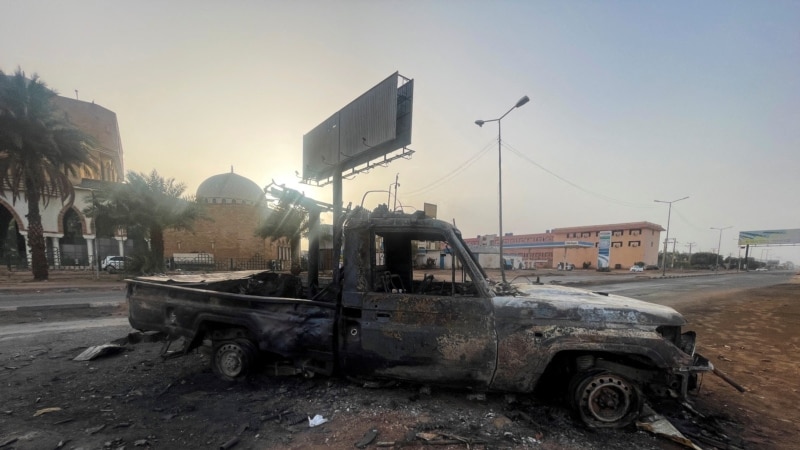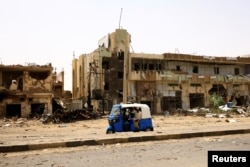Conspiracy Theorists Falsely Call Sudan Conflict a Russia-U.S. Proxy War
On April 27, fighting again erupted in Sudan’s capital Khartoum and nearby cities following the end of a three-day cease-fire mediated by the United States and Saudi Arabia.
The warring factions – the Sudanese armed forces led by Sudan’s de facto military ruler, Abdel Fattah al-Burhan, and the paramilitary Rapid Support Forces (RSF), led by Mohamed Hamdan “Hemedti” Dagalo – then agreed to a renewed 72-hour cease-fire.
But there are reports of continued fighting in the capital and elsewhere.
On April 26, the U.S. State Department said Secretary of State Antony Blinken had spoken with African Union Commission Chairperson Moussa Faki Mahamat “about U.S.-AU collaboration to create a sustainable cessation of hostilities and end the fighting in Sudan.”
Despite U.S. efforts to stop the fighting, a conspiracy theory has spread online that the fighting in Sudan is a proxy war between the United States and Russia.
For example, Pakistani political commentator Syed Zaid Zaman Hamid tweeted:
“In Sudan, it is not just a civil war between two Generals…. It is a proxy war between America and Russia… Just as they are doing in Syria today. The Army in Sudan is backed by the Russians. The rebel paramilitary is backed by the Americans… It’s for control of Sudan…
That is false.
There is no evidence that the U.S. has supported either faction in the Sudan conflict. Washington has consistently supported the establishment of an inclusive, civilian-led government in Sudan.
There is evidence that Russia has provided support to Hemedti’s Rapid Support Forces, not the Sudanese armed forces under al-Burhan’s control.
In October 2021, the U.S. condemned Hemedti and al-Burhan for collaborating to overthrow the transitional government that formed following the 2019 ouster of strongman Omar al-Bashir, who had ruled Sudan for three decades.
Shortly after al-Bashir was deposed, the Washington-based Middle East Institute published an analysis stating that Saudi Arabia and the United Arab Emirates (UAE) backed Hemedti, fearing “a truly democratic revolution … in their own backyard.”
Russian mercenary forces linked to the Kremlin were implicated in helping Sudan’s 2021 coup-makers suppress popular protests.
After the 2021 coup, the United States suspended $700 million in aid to Sudan intended to help its transfer to civilian governance. The move is in conformity with the U.S. legislation banning aid to countries in which a democratically elected government was overthrown by the military. The U.S. Congress passed that act in early 1990, after al-Bashir seized power in Sudan in a bloodless military coup. The U.S. Agency for International Development then followed halting nonhumanitarian aid to Sudan.
Before fighting erupted between the once-allied generals on April 15, the U.S. and other powers pushed for a framework agreement between Sudan’s military rulers and civilian leaders. That agreement was portrayed as “an essential first step toward establishing a civilian-led government.”
And al-Burhan and Hemedti balked at many of the framework agreement’s conditions, which threatened their power in various ways.
That, in part, has led to the current power struggle.
The Russian private military company Wagner Group (Wagner PMC) has reportedly played a role in Sudan’s current chaos.
Wagner forces operating in Sudan have armed and trained Sudanese military and paramilitary factions in exchange for gold mining concessions.
Faced with Western sanctions, Russia is reportedly using that gold to fund its war in Ukraine.
Both factions in Sudan’s current conflict have helped Russia smuggle gold out of the country.
But media reports suggest that the Wagner Group is backing the RSF, not the Sudanese armed forces.
France’s Jeune Afrique magazine reported that Wagner has worked with Khalifa Haftar’s Libyan National Army to provide logistical support to the RSF.
CNN, citing Sudanese and regional diplomatic sources, reported on April 21 that Wagner is also providing surface-to-air missiles to the RSF.
Experts contacted by the Voice of America offered similar conclusions.
Cameron Hudson, a senior associate at Washington’s Center for Strategic and International Studies and a former U.S. State Department official, told VOA that the Wagner Group is supplying the Rapid Support Forces with portable air defense systems, shoulder-fired rockets, tank busters and heavy armor.
Other analysts say Russia’s primary interest is to end up on the side of the victor, with Moscow’s ties to both sides ensuring a “win-win” situation.
Moscow’s interests in Sudan extend beyond gold.
On December 20, 2018, Sudan inked a deal with Russia allowing it to build an oil refinery in Port Sudan, on the Red Sea.
In February of this year, Sudan’s ruling council concluded a review of an agreement that will allow Russia to build a naval base at Port Sudan.
Some conspiracy theories posted online have linked the alleged proxy war in Sudan to U.S. opposition to that planned Russian naval base.
That claim does not specify which Sudanese faction the U.S. is allegedly supporting. Nor is there evidence that either of Sudan’s two warring factions opposes the opening of that base.
The review of the base agreement was completed when Hemedti was still al-Burhan’s deputy.
Following a weeklong trip to Moscow in December 2021, Hemedti said he was not opposed to Russia or anyone else opening a base in Sudan.
Still, Ariel Cohen, a nonresident senior fellow at Washington’s Atlantic Council, told Polygraph.info the RSF was more likely to see through the establishment of the base, due to its Wagner ties.

This article has been archived for your research. The original version from Polygraph.info can be found here.



